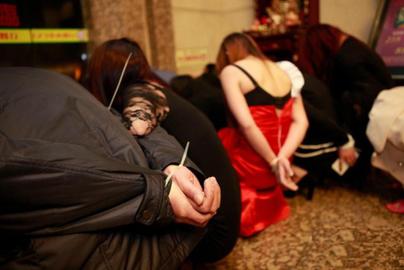Iran: Rise of sexual exploitation, forced military draft, and the violation of victim’s rights
This report, conducted by the US State Department regarding human trafficking concerns globally, states:
“The Government of Iran does not fully meet the minimum standards for the elimination of trafficking and is not making significant efforts to do so; therefore, Iran remained on Tier 3.” Tier 3 is the lowest rank in the fight against human trafficking. The only other countries that share this rank with Iran are Eritrea and Equatorial Guinea.
Iran’s Ministry of Foreign Affairs denies the findings of the 2017 report, and refers to Iran as an active member of the global fight against human trafficking. The ministry also states that “the roots of this phenomenon go back to the US and its allies’ aggressive and imperialistic policies.”
The State Department report continues: “However, as in previous reporting periods, the [Iranian] government did not share information on its anti-trafficking efforts. Public information from NGOs, the media, and international organizations indicate the government did not take significant steps to address its extensive trafficking problem. Trafficking victims remained highly vulnerable to punishment, including death, for unlawful acts committed as a direct result of being subjected to trafficking.”
The report also exposes the fact that: “Allegations continued that Iranian officials coerced Afghan men into combat roles in Syria, and the Iranian government provided financial support to militias fighting in Iraq that recruited and used child soldiers.”
From Tehran and Shiraz to Iraq and Syria: Who are the Victims of Human Trafficking?
The US State Department writes: “In 2015 and 2016, the Iranian government provided funding to the militia Asa’ib Ahl al-Haq — also known as the League of the Righteous — which reportedly organized training camps for high school and university students, some of whom may be under the age of 18, in southern Iraq. According to an Iraq-based source, the Iranian government also provides funding to the militia Abu Fadhl al-Abbas Brigades, which used children in combat on the front-line in Fallujah, Iraq.”
Concerning the inhumane condition Afghan refugees endure in Iran, especially Afghan children, the report states: “Children of Afghan refugees — either registered or unregistered —continued to have difficulty obtaining legal documentation, while children born to Iranian mothers and non-Iranian fathers were not Iranian citizens under law and therefore remained undocumented; these policies increased these populations’ vulnerability to exploitation.”
The report also adds: “Organized criminal groups kidnap or purchase and force Iranian and migrant children, especially Afghan refugee children, to work as beggars and street vendors in cities including Tehran. These children, who may be as young as three years old, are coerced through physical and sexual abuse and drug addiction.”
According to the report: “Organized groups reportedly subject Iranian women, boys, and girls to sex trafficking in Iran, Afghanistan, the Iraqi Kurdistan Region (IKR), Pakistan, United Arab Emirates (UAE), and Europe.”
Regarding the problem of sexual exploitation, the State Department reports: “In 2016, there was a reported increase in young Iranian women in prostitution in Dubai; some of these women may be trafficking victims. From 2009–2015, the transport of girls from and through Iran en route to other Persian Gulf states for sexual exploitation reportedly increased.”
The report continues: “Iranian girls were subjected to sex trafficking in brothels in the IKR, especially Sulaimaniya ... In Tehran, Tabriz, and Astara, the number of teenage girls exploited in sex trafficking reportedly continues to increase ... Trafficking rings reportedly use Shiraz, Iran as a transit point to bring ethnic Azeri girls from Azerbaijan to the UAE for commercial sexual exploitation.”
The US State Department’s Concerns Regarding Loopholes in Iran’s Legal System
In its most recent report, the State Department points out: “[The Iranian] government did not initiate anti-trafficking investigations due to a lack of political will and widespread corruption.”
According to the findings, the loopholes in Iran’s legal system against human trafficking are as follow:
- Iranian law does not prohibit all forms of trafficking.
- The penalty for the trafficking of adults is not sufficiently stringent.
- The penalty for forced labor and debt bondage is not sufficiently stringent.
- Courts accord legal testimonies given by women only half the weight accorded to testimonies given by men, thereby restricting female trafficking victims’ access to justice.
- Moreover, female victims of sexual abuse, including sex trafficking victims, are subject to prosecution for adultery, which is defined as sexual relations outside of marriage and is punishable by death.
US Recommendations for Iran to Improve its Status Quo
The recommendations of the US State Department for Iran are as follow:
- Cease coercing individuals into combat in Syria.
- Cease support for armed militias that recruit and use children in Iraq.
- Ensure sex and labor trafficking victims are not punished for unlawful acts committed as a direct result of being subjected to trafficking.
- While respecting due process, investigate and prosecute sex trafficking and forced labor cases.
- Institute procedures to identify trafficking victims, particularly among vulnerable populations such as persons in prostitution, street children and undocumented migrants.
- Offer specialized protection services to trafficking victims, including shelter and medical, psychological and legal assistance.
- Develop partnerships with international organizations to combat trafficking.
- Increase transparency of anti-trafficking policies and activities.
- Become a party to the 2000 UN Protocol to Prevent, Suppress and Punish Trafficking in Persons
visit the accountability section
In this section of Iran Wire, you can contact the officials and launch your campaign for various problems

























comments